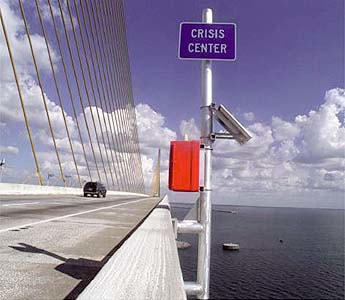 Last week I got to attend a seminar on Mental Health, specifically about the integration of faith into counseling. I'm deeply indebted to the hard work that Samaritan is doing to serve people in our region who are battling with depression, anxiety, PTSD, and more issues that are much beyond the scope of what we as pastors can do to care for them. But there was one thing that was shocking in the presentation: Florida ranks second nationally among adults with serious thoughts of suicide. The study found that 3.44% of adults in Florida have serious thoughts about suicide, which is over 500,000 people. That's staggering. And all I could do when I read that was ask "Why?" On the surface when you're in Florida you're surrounded by beaches, Disney World, sunshine all year long, no cold (except those days when it dips below 60, and yes that is cold) weather, and tons of amenities and things to do. We've often commented that it's hard to have a bad day with palm trees in your yard. But behind that is a staggering number that over 500,000 of our neighbors and friends are seriously thinking of suicide. For so many around us, paradise is an illusion. It becomes a veneer they hide their pain and hurt behind. I want to propose 4 ways to help us think about how to lead well in this: 1. In our preaching, don't gloss over the effects of the Fall - When we read Genesis 3 we see that sin (and with it death) entered and threw all of creation in a tailspin. The effects of the Fall are more than Adam & Eve's expulsion, it impacts our minds, our hearts, our relationships, and ultimately our souls. We cannot simply gloss over the fallenness of the world around us, which we rarely do with cancer but often do with our mind. 2. In our preaching, point to Jesus as the source of hope - The opposite of the cumulative effect of the Fall is the cumulative effect of the Gospel to bring hope and healing. When we are found in Christ, we're more than just saved for heaven, we're transformed from within. And with that transformation comes something we're all longing for: hope. The ultimate of that hope is that one day we'll spend eternity with Jesus, but the temporal of that hope is that we can face tomorrow because He lives. 3. In our pastoral care, be wise - I firmly believe that almost all pastors have the best of intentions when they meet with someone going through difficult times. They genuinely want to help, they want to offer hope and lead them to the peace found in Christ. But in our pastoral care, we must walk wisely with people. That wise walking means that we have to be honest about our limits of what we can do, both for schedule and for expertise. Typically that means having a set number of appointments before seeking additional care. It's hard to be rigid on that, but I would strongly discourage from having more than a few appointments so that you don't become overwhelmed with just doing pastoral care. But we also need to recognize our limits of expertise. In some cases, what someone is dealing with is chemical/biological, and we cannot assume that our pastoral care is enough for someone in need of medical treatment. Or someone may be dealing with issues beyond what we're able to delve into with our training and experience. These are times when we're best for their sake to seek a referral.
0 Comments
Leave a Reply. |
Scott M. DouglasA blog about leadership and the lasting legacy of family ministry. Archives
August 2023
Categories
All
|
 RSS Feed
RSS Feed



